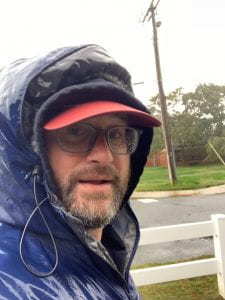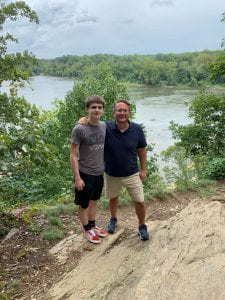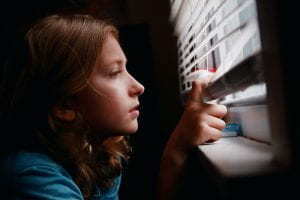Spike Cook's Blog, page 3
December 6, 2020
10,000 Steps a Day: One Step At a Time for 6 Months!

Get ten thousand steps wherever you can.
On June 6, 2020 I made a promise to myself to integrate a walking program into my life. Previously, I have tried so many different exercise regimens into my life and accomplished a few things along the way (finished a marathon, few half marathon, 5Ks, triathlon etc.) but these all happened a few decades ago and often lead to injuries. To me, walking was just a way to get from one point to another or something that I did when I was “hiking.”

My new walking companion, Rico. He doesn’t always make walking easy.
I approached walking 10,000 steps differently because I was looking for different results. I wasn’t looking to lose weight, set any records or to get myself ready for anything else. I just wanted to walk to ground myself, maintain balance, experience weather changes and practice mindfulness. In reality, I just wanted to enjoy the walk and I did.
As I got closer to the 6 month streak I started to reflect on the magnitude of steps. I went through my Setpz App and analyzed the data (I use the free version). I walked an average of 11,000 steps a day for 189 days which is about 2,079,000 total steps since June 6. Prior to starting this journey, I never imagined that I could have walked that many steps.

This was when I was walking in a Nor’easter
Walking 10,000 steps a day required patience and time management. I learned a lot of things along the way. Here are 10 insights about my first six month streak walking 10.000 steps a day:
Don’t chase steps – The earlier you get your steps in, the better. I definitely had some times where I was trying to get my steps in later in the evening and that lead to stress.Break up the walks – You don’t have to get all your steps in at once. I rarely had walks longer that 6 or 7 thousand steps. I liked chunking the steps throughout the day.Communicate to friends and loved ones – Let the people you spend the most time with know your goal. This helps with accountability and even a conversation.Invest in good sneakers – I wear running shoes that I get from the South Jersey Running Company. They specialize in matching shoes with your specific biomechanics.Be prepared for the weather – I walked in the rain, heat, wind and in the morning, afternoon and evening. I paid a lot of attention to the weather to see when the best time would be to walk.Vary your path – I am fortunate to have a bike path near my house which makes walking very easy, but I get bored. I like changing it up by walking other places.Park far away from your destination – If I am going to a store I usually park away from the entrance. Not only do you get more steps, but you avoid all of cars trying to get in and out of spots.Make calls – Nowadays, almost everyone who talks to me on the phone asks if I am walking.Listen to music or a podcast – When I first started out I listened to a lot of podcasts and music. As time went on, I found myself just enjoying walks without my ear buds in.Look up at the sky – Since it is getting dark earlier, I get to see a lot more of the stars and planets. In one walk this month (December) I was able to see Mars, Jupiter and Saturn with the assistance of a Star Map app.My next goal is to make 10,000 steps a day for an entire year. I have 6 months to go, but I know I just need to take one step at a time.
Drop a comment if you plan or have embarked on a walking journey!

A hike with my son, Henry in Virginia.
About the Author
Spike Cook, Ed.D., Principal, Lakeside Middle School, Millville, NJ. In addition to being a Principal, Dr. Cook published two books through Corwin Press (Connected Leadership:It’s Just a Click Away; Breaking Out of Isolation: Becoming a Connected School Leader). He is the co-host of the PrincipaPLN podcast and his blog, Insights Into Learning, was recognized as a finalist for Best Administrator Blog by the EduBlog Awards. Spike earned his Doctorate from Rowan University and is featured in their Alumni Spotlight. Dr. Cook is also on the Education Advisory Board for Whole Health Ed. Connect with @drspikecook via Twitter.
October 11, 2020
Maintaining Balance for Learning During Crazy Times: A Thoughtful Guide for Parents and Educators

Photo by Jeremy Thomas on Unsplash
In honor of November being the month of Gratitude, Dr. Aili Pogust and Dr. Spike Cook will be hosting a 5 part weekly series on maintaining balance during these crazy times. There is no cost for the workshop and if you are interested you can sign up here. We are asking those who are interested to attend all 5 sessions.
Promo Video
About the series
Is what you have been doing to maintain your balance working for you these days? You are living in a crazy time. Perhaps you’ve noticed that you can no longer follow the paths to which you’ve been accustomed. Creating new paths, however, requires a better awareness of how the physical, emotional, mental and spiritual aspects of your life need to remain balanced.
Your children and your students are counting on that. Before you can help them you have to help yourself. This workshop will offer you some thoughtful tools to get started. In closing, here’s something to consider. Our western culture has focused intensely on the physical and mental aspects of our lives. Notice if you have an urge to attend only a select date. What might that be saying about your state of balance?
Dates and times
Tuesday on November 10, 17, 24, December 1, 8 (2020) Time: 7:00 PM EST – 8:00 PM EST (Zoom link will be provided to those who register.) Register here. Registration ends November 9 at 10:00 PM.
Overview of each week
November 10
November 17
You will learn and practice tools to balance your physical body. Application to children/students will be explored.November 24
You will learn and practice tools to balance your emotional body. Application to children/students will be explored.December 1
You will learn and practice tools to balance your mental body. Application to children/students will be explored.December 8
You will learn and practice tools to balance your spiritual body. Application to children/students will be explored.About the Presenters
Dr. Aili Pogust  Aili has been an educator for over 40 years. She has taught elementary, middle and high school grades as well as graduate school. As an educational trainer, consultant and coach she has focused her work with educators on supporting effective practices in teaching literacy, communicating well and infusing curriculum with the social/emotional aspects of learning. Her focus as an educator is centered on the process of learning rather than the process of schooling. Aili received her doctorate from Temple University. She authored the book entitled: Communicating With Clarity: A Pocket Guide for Humans. Aili is the co-founder of The Pogust Group: Mining the Gems of Human Potential.
Aili has been an educator for over 40 years. She has taught elementary, middle and high school grades as well as graduate school. As an educational trainer, consultant and coach she has focused her work with educators on supporting effective practices in teaching literacy, communicating well and infusing curriculum with the social/emotional aspects of learning. Her focus as an educator is centered on the process of learning rather than the process of schooling. Aili received her doctorate from Temple University. She authored the book entitled: Communicating With Clarity: A Pocket Guide for Humans. Aili is the co-founder of The Pogust Group: Mining the Gems of Human Potential.
Dr. Spike Cook Spike Cook, Ed.D., Principal, Lakeside Middle School, Millville, NJ. In addition to being a Principal, Dr. Cook published two books through Corwin Press (Connected Leadership:It’s Just a Click Away; Breaking Out of Isolation: Becoming a Connected School Leader). He is the co-host of the PrincipaPLN podcast and his blog, Insights Into Learning, was recognized as a finalist for Best Administrator Blog by the EduBlog Awards. Spike earned his Doctorate from Rowan University and is featured in their Alumni Spotlight. Dr. Cook is also on the Education Advisory Board for Whole Health Ed. Connect with @drspikecook via Twitter.
Spike Cook, Ed.D., Principal, Lakeside Middle School, Millville, NJ. In addition to being a Principal, Dr. Cook published two books through Corwin Press (Connected Leadership:It’s Just a Click Away; Breaking Out of Isolation: Becoming a Connected School Leader). He is the co-host of the PrincipaPLN podcast and his blog, Insights Into Learning, was recognized as a finalist for Best Administrator Blog by the EduBlog Awards. Spike earned his Doctorate from Rowan University and is featured in their Alumni Spotlight. Dr. Cook is also on the Education Advisory Board for Whole Health Ed. Connect with @drspikecook via Twitter.
March 27, 2020
5 Observations on Education During a Pandemic

Photo by Sharon McCutcheon on Unsplash
Schools across the globe have been forced to close their doors in a sweeping response to the COVID 19 pandemic. Many educators found this out with little to no time to prepare and it has been challenging for everyone. The school buildings are closed but the learning is continuing and it is revealing a lot about the state of education.
Here are 5 Observations on Education During a Pandemic:
Socioeconomics continues to be one of the major factors impacting education. This debate (and unfortunately it has been a debate) continues as many people are seeing that those families living in poverty do not have an equitable access employment, technology or food. This hasn’t changed with the closing of school, it has just become more apparent. The big question is…. what are we doing about it?Educators who lead with a Growth Mindset in regards to technology and remote student learning are having the most successes. If you are being asked to change your mode of instruction (sometimes with less than 24 hours of notice) there is not a lot of time to remain fixed about what teaching and learning is going to look like. By and large educators have taken risks, tried new things and gone out of their comfort zones to ensure that students continue learning during this unprecedented time.The need to “play school” in the 19th century sense is still alive and well. Those who are trying to play this type of school are struggling. Many educators report that they are “business as usual” or that they are “keeping the curriculum moving forward.” This can be a troublesome approach since the variables of educating students remotely have been drastically increased. How can we approach business as usual when parents are responsible for balancing their jobs (if they still have them), ensuring that their children are following the remote learning plans, all while everyone wonders what the long term impact of this pandemic will be?Collaboration is key. Educators collaborate all the time during the traditional school year. Teachers use formal and informal ways to collaborate while in a traditional school setting. During remote learning, educators have had to investigate new forms of communication, attend virtual meetings, use back channels and recognize the importance of social media. Teachers are doing this while also taking care of their own children.Many were prepared for this. There are countless educators who have sacrificed their mornings or evenings to attend Twitter Chats to grow and connect with others outside their school walls. They listened to Podcasts, joined Voxer groups all in the hopes to learn something new or connect with like minded educators. Numerous educators gave up their Saturdays to attend EdCamps where the un-conference model allowed for an innovative, learner-centered professional development that they were not getting inside the school walls. Thought leaders such as Will Richardson, Eric Sheninger, Diane Ravitch, Baruti Kafele, and Rafranz Davis were telling us over the last few years that we needed to look at the education paradigm differently, uniquely because we are in a new age.So where do we go from here?
Eventually we will head back to the school buildings but the hope is that this experience will force educators to reflect on the current mode of education and to determine what changes they will need to make moving forward to connect with students on a deeper level. Maybe the teachers will be able to take charge of the curriculum again and force state and local legislatures to put the kid’s needs first. Maybe, just maybe the public will see that all of the teacher bashing that has been en vogue over the last 20 years needs to stop and we need to work together for our kids!
Spike Cook, Ed.D., Principal, Lakeside Middle School, Millville, NJ. In addition to being a Principal, Dr. Cook published two books through Corwin Press (Connected Leadership:It’s Just a Click Away; Breaking Out of Isolation: Becoming a Connected School Leader). He is the co-host of the PrincipaPLN podcast and his blog, Insights Into Learning, was recognized as a finalist for Best Administrator Blog by the EduBlog Awards. Spike earned his Doctorate from Rowan University and is featured in their Alumni Spotlight. Connect with @drspikecook via Twitter.



